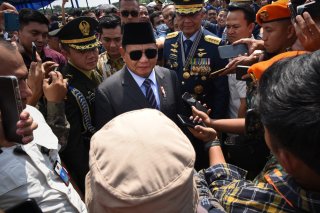Harold Sacau

As the dust settles from a recent bilateral meeting between President Biden and Indonesian President Joko Widodo, engaging at the White House to announce a new strategic partnership, it’s important to note that with seismic geopolitical shifts in full view in America, the Indonesian 2024 election is also just around the corner.
Most pollsters agree that Indonesia Defense Minister Prabowo Subianto will most likely be Indonesia’s eighth president after the votes are counted on February 14, 2024. His numbers put him ahead of former Central Java governor Ganjar Pranowo and former Jakarta governor Anies Baswedan. In the latest poll by Indikator Politik Indonesia, released last month, Prabowo was the preferred candidate of 40.6 percent of respondents.
Prabowo was previously blocked from U.S. entry due to human rights concerns by the Clinton, Bush, and Obama administrations. The accusations stem from his time in Indonesia’s special forces under the Suharto dictatorship, leading to his dismissal from the armed forces in 1998. Prabowo was invited back to Washington D.C. in 2020 for defense cooperation talks at the Pentagon. He denies all wrongdoing.
In two prior runs for the presidency, both of which Widodo (also known as “Jokowi”) won over Prabowo, the military veteran demonstrated his differences from his recent boss.
With Widodo’s son Gibran Rakabuming Raka further positioned as his running mate, Prabowo is even more likely to continue Jokowi’s policies, including building a new national capital in Borneo.
As Indonesia ultimately ascends to the forefront of the ASEAN marketplace and critically considers decoupling from China’s geo-commercial dependency and towards Western interests, it is startling that most Westerners have very little knowledge of Prabowo’s career.
After graduation, Prabowo finished the military academy in Magelang and joined the Kopassus, Indonesia’s special forces. He quickly rose through the ranks and was sent to various overseas military courses. This includes studying at Fort Bragg, GS9, and Fort Benning throughout his military career.
Prabowo remains a favorite of Indonesia’s military and has won support from military bases in his past presidential campaigns. His politics marry a business-friendly approach with strong social programs, a mix of ‘New Deal’ social democracy, and Tony Blair’s Third Way Labourism.
They have also brought him many allies. As he often says, “One thousand friends too few, one enemy too many.”
Many past rivals and political parties seem to be seeking to join his ranks. For example, the National Mandate Party (PAN) Chairman Zulkilfi Hasan has convened with Prabowo to discuss a new “grand coalition,” allegedly to comprise at least five incumbent parties. Even democracy activists have joined and supported his bid for the presidency. Budiman Sudjatmiko, for example, left the Indonesian Democratic Party of Struggle (PDIP), the most-represented party in Indonesia, and the party of Jokowi to support Prabowo’s 2024 bid.
As a moderate Muslim, he respects the dominant religion of his country while always including all the religious minorities in a commitment to Indonesian diversity correlated to strength. He is famous for beginning his political speeches with all the religious greetings in a row.
With his conciliatory approach in religious matters in a nation facing a crisis of intolerance, he bridges the divide between the moderate Muslims and the more rigorous Muslims and is seen as an acceptable statesman by both.
In his current job as Minister of Defense, Prabowo quickly noticed that Indonesia was vastly underspending compared to its neighbors. To level the playing field, he launched a twenty-five-year rearmament budget encompassing all branches of the military.
His Indonesia Maju (Onward) coalition regroups a number of influential political parties, from his own Gerindra to Hartato’s Golkar, SBY’s Democratic Party, Zulkifli’s PAN, as well as other minor parties such as PBB, Garuda, Gelora, and possibly even PSI.
Despite pleas by both of Prawobo’s rivals, Jokowi himself may even end up backing his campaign, one with many priorities, including continuing industrialization, providing affordable housing, strengthening micro, small, and medium enterprises (MSMEs), supporting education in science and technology, reforming the bureaucracy, and preserving arts and culture.
With Indonesia slated to become the world’s fourth-largest economy by 2045, with the nation taking a more aggressive position in Global South collaboration (especially partnerships with African nations), the country’s ascendance warrants greater U.S. attention and engagement.
Indonesia is a critical partner to America in the Indo-Pacific. The nation quietly hosts both the largest Muslim majority and the world’s busiest sea lanes—more than $5 trillion in cargo, and roughly 50 percent of the world’s oil tankers pass through the country’s waters every year.
In this light, the military relationship between the United States and Indonesia has also strengthened against China’s regional threats to territorial integrity. Both militaries cooperate in joint training like the multilateral Super Garuda Shield exercise, which involves the armed forces of Indonesia, the United States, Australia, Japan, France, and the UK.
The coming elections will indeed offer analysts the opportunity to weigh the policy priorities of each candidate and determine who will serve as the best conduit for effective trade and foreign direct investment.
As his coalition and poll numbers continue to rise, one can expect a return visit to Washington D.C. imminently—a Prabowo Subianto presidency is in clear view.
No comments:
Post a Comment